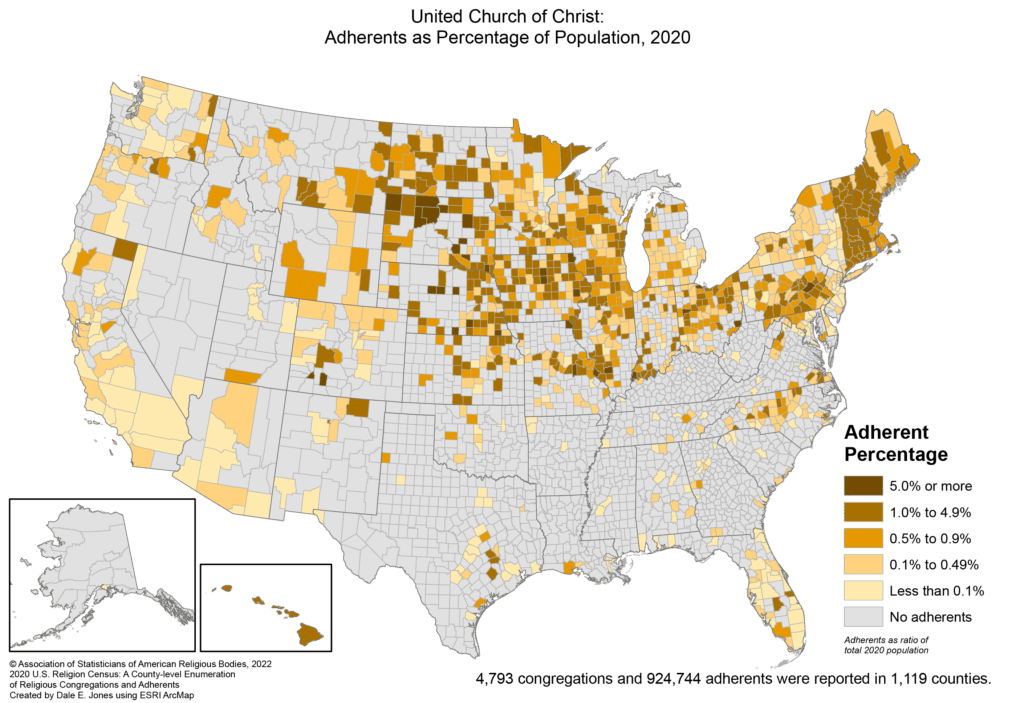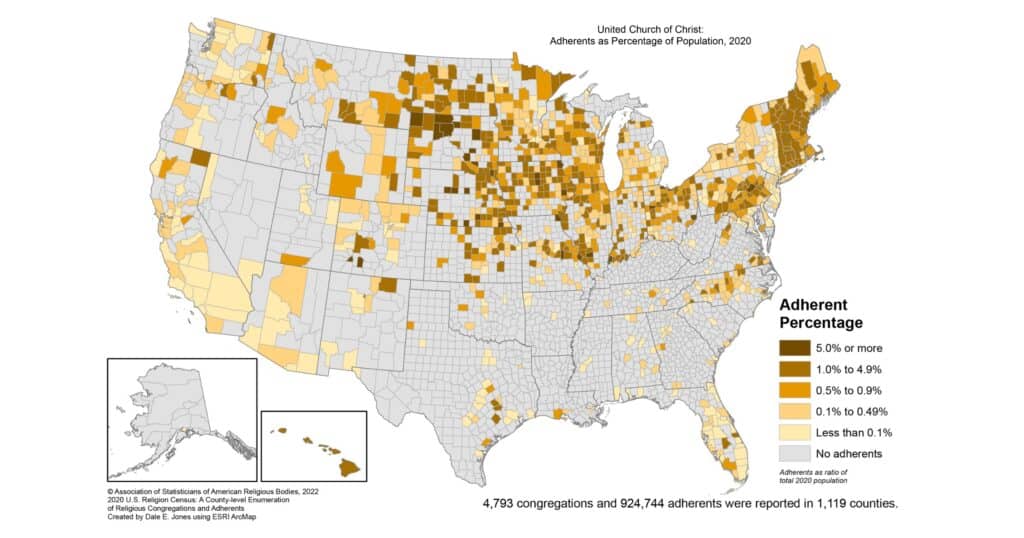Researchers release religious study of every U.S. county, and elect a UCC leader
Statisticians who focus on religion have just released a major county-by-county study — and have elected the United Church of Christ’s research director as their president.
The Association of Statisticians of American Religious Bodies issued results of its once-every-decade U.S. Religion Census Nov. 11. Based on 2020 findings, the study identified 372 religious bodies, 356,739 congregations and 161,371,931 adherents.
Erica Dollhopf, who provided UCC figures to the religion census, is encouraging UCC members — and others — to explore the many downloadable maps, charts and graphs at the study’s website. She directs the UCC’s Center for Analytics, Research and Development, and Data — and is now ASARB’s president, having been elected at its fall meeting, held at the UCC’s new Cleveland offices.
“UCC readers might be interested to see if their experience in their own local community mirrors what’s happening in the county or state in which they live,” she said.

‘Adherents’ vs. ‘members’
The census shows the UCC as having had 4,793 congregations and 924,744 adherents in 2020. “Note that adherents is different from membership or worship attendance, so this number will look different than what we report in the UCC Yearbook,” Dollhopf said. “Adherents reflects the most complete count of individuals affiliated with a congregation, including members, children of members, and other attendees who are not members.
“Also, close readers of the Yearbook will note that 4,793 is one fewer church than is listed in the 2020 Yearbook. This is because one church that is part of the Northern Plains Conference is geographically in Canada, so that was not included this particular data set, as the U.S. Religion Census only counts congregations and adherents in the U.S.”
The UCC saw a decline in numbers since the last census, from 5,225 congregations and 1,284,296 adherents in 2010. In commenting on similar losses among all mainline Protestant denominations, Scott Thumma, director of the Hartford Institute for Religion Research, said, “Denominational brands have weakened, and divisions have increased over issues such as female clergy or sexual orientation.”
As for the UCC, Dollhopf agreed that “it is likely that divisions over various issues have impacted UCC membership throughout our history.” However, she said, “while the UCC has had a net decrease of members and congregations every year since the 1960s, we know that UCC identity continues to resonate with many of our existing congregations and, even though there is a net loss of congregations at the end of each year, the UCC continues to add congregations to our records at an annual rate that is the equivalent of adding a new congregation every three weeks.”
Census highlights
Overall, the census suggests vibrant, varied religious life in the U.S. Among the highlights noted in an ASARB news release about it:
- “The Catholic Church has the most adherents, with more than 61 million, the Southern Baptist Convention has the most congregations, with more than 51,000, and the United Methodist Church is in the most counties, 2,989.”
- “Non-Christian bodies continue to increase their presence. The number of Muslims, for example, increased from 2.6 million to 4.5 million. The [census] includes congregation counts of five other non-Christian bodies and congregation and adherent counts for Baháʼí, three Buddhist groups, three Hindu groups and four Jewish groups.”
- “Oriental Orthodox Christians have surged but Eastern Orthodox have decreased.”
The 2020 religion census includes the first-ever count of Jehovah’s Witness adherents. It also has the most-extensive counts ever of Amish and Plain Anabaptist bodies.
Dollhopf said she looks forward to leading an organization that brings varied faith traditions together for important statistical work. As president, she’ll supervise ASARB’s activities and operations and preside over its annual meeting. “I am honored and excited to be in this role and to have the opportunity to continue facilitating conversations among religious groups about data collection best practices and strategies.”
Content on ucc.org is copyrighted by the National Setting of the United Church of Christ and may be only shared according to the guidelines outlined here.
Related News
A Prophetic Call for Justice and Peace in Palestine
The executive leaders of the United Church of Christ have issued the following statement...
Read More‘Love is Greater Than Fear’: Regional Youth Events get to the heart of gospel message
United Church of Christ teens attending this summer’s Regional Youth Events (RYE) are...
Read MoreUCC desk calendars available to order now
Prepare for your day, month and year with the United Church of Christ desk calendar —...
Read More


